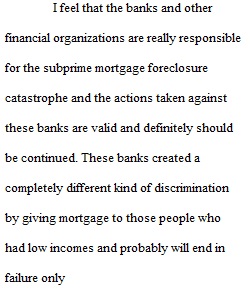


Q 1) how responsible are banks and other financial institutions for the subprime mortgage foreclosure catastrophe in America? Many financial institutions have been sued, and several judgments have been handed down against the mortgage industry, including a decision involving law suits by 49 state attorney generals (https://www.justice.gov/opa/pr/federal-government-and-state-attorneys-general-reach-25-billion-agreement-five-largest), as well as a suit involving federal regulators regarding improper practices by mortgage lenders in foreclosure proceedings. Predatory lending practice accusations have also been lodged by the Justice Department, resulting in a 2012 judgment against Wells Fargo, although Wells Fargo admits no wrongdoing: http://www.csmonitor.com/Business/2012/0712/Wells-Fargo-to-pay-175M-in-discrimination-lawsuit. Last year, the Supreme Court ruled that cities have the right to sue banks over their predatory lending practices, so this issue is still very much in the news: https://www.reuters.com/article/us-usa-court-discrimination-idUSKBN17X1UF. Recently, Wells Fargo was ordered by the Justice Department to pay an additional $2.09 billion to settle claims on subprime and other risky mortgages. And just yesterday, Wells Fargo admitted guilt in foreclosing on homeowners it should have helped: https://www.washingtonpost.com/business/2018/11/06/wells-fargo-admits-it-incorrectly-foreclosed-homeowners-it-should-have-helped/?utm_term=.7ec4dc418d3e. 2) as this foreclosure problem has affected African Americans and people of color at a much higher rate than other Americans, should the courts continue to look to the violation of the rights of African Americans and other targeted minorities in order to provide a remedy to this problem? The financial crisis caused an increase in the wealth gap between minority families and other Americans, which now stands at 13:1: http://www.pewresearch.org/fact-tank/2014/12/12/racial-wealth-gaps-great-recession/. 3) how can we move forward in the financial services industry to avoid these problems in the future? What can we learn from studying our own local area? In October 2015, new rules by the Consumer Protection Financial Bureau were implemented to simplify the mortgage process for first-time home buyers: http://www.chicagotribune.com/business/yourmoney/sc-millennial-money-advice-bigda-consumer-1008-20151005-column.html. But the situation is far from over: http://www.cbsnews.com/news/americas-foreclosure-crisis-isnt-over/. Also, here are a few recent stories of fallout from the Financial Crisis: http://www.npr.org/2016/05/22/479038232/a-decade-out-from-the-mortgage-crisis-former-homeowners-still-grasp-for-stabilit?utm_source=facebook.com&utm_medium=social&utm_campaign=npr&utm_term=nprnews&utm_content=20160522.
View Related Questions